The Impact and Benefits of Mushrooms in Our Lives


Intro
Mushrooms have long held a place in various cultures, whether for their culinary richness or their medicinal powers. The fascinating world of fungi is waking up to the needs and curiosities of our current age, bringing attention to a plethora of benefits that mushrooms can offer. From enhancing health to influencing eco-friendly practices, these hardy organisms pack quite the punch. They play a pivotal role in our ecosystem and fuel innovation across industries. In this article, we will journey through the depths of mushroom’s benefits — not just limited to the dinner table but extending into fields such as medicine, sustainability, and technology.
Here, we aim to bring forth the full spectrum of their significance in both nature and modern life, examining the impact of mushrooms on health, environment, and the very fabric of our society. By illuminating their unique qualities and potential applications, we intend to broaden the understanding of how mushrooms fundamentally shape our world today and could inspire tomorrow's advancements.
"Fungi are the great decomposers — without mushrooms, we would be buried under the weight of our own waste."
This statement illustrates how integral mushrooms are to maintaining our ecological balance. Beyond their role in nature, they are foundational in local communities, influencing everything from agricultural practices to innovative designs in technology and materials. With various sectors exploring the promising aspects of fungi, this discussion is worthwhile for anyone interested in the intersections of health, sustainability, and creativity.
In the following sections, we will delve deeper into these realms, highlighting the latest trends and discoveries that underscore the relevance and power of mushrooms in shaping our future.
Prelude to Mushrooms
Mushrooms have long captivated human interest, stretching from the simplicities of forest foraging to the frontlines of modern science. The importance of this topic cannot be overstated when examining the role fungi play in our ecosystems, diets, and even medicine. Understanding mushrooms is not merely an academic exercise; it can impact sustainability, nutrition, and health on multiple levels.
Definition and Classification of Mushrooms
Mushrooms belong to a kingdom of life known as fungi, which are distinct from plants and animals. They are officially classified into various groups – some of the most recognized include the Chanterelles, Shiitake, and Portobello. Within these classifications, one finds a wealth of diversity – shapes, sizes, flavors, and medicinal properties vary significantly. Each type might have its own growth conditions, preferred habitats, and roles in their environment. For example, Porcini mushrooms thrive in symbiotic relationships with trees, while other varieties prefer decaying wood or soil.
"The world of mushrooms is as nuanced as a symphony, each note playing a vital role within the greater harmony of our ecosystem."
First and foremost, mushrooms can be categorized into edible, poisonous, and medicinal types. The edible types grace our plates and add richness to various cuisines worldwide. Poisonous mushrooms, on the other hand, can be detrimental to human health, and knowledge of them is crucial for foragers. Medicinal mushrooms, such as Reishi and Lion’s Mane, are admired for their potential health benefits, contributing to the burgeoning field of mycotherapy.
Historical Significance of Mushrooms in Human Culture
The history of mushrooms intertwines with humanity’s journey through culture, art, and medicine. In ancient times, civilizations such as the Egyptians revered fungi, associating them with immortality. This historical significance continues today, with mushrooms appearing in folklore and mythology across different cultures. In many societies, mushrooms symbolize mystery and the unknown, often cited in literature as metaphors for transformation or the passage between life and death.
Mushrooms have not only been valued for their culinary uses but also for their medicinal properties throughout history. Traditional Chinese medicine incorporates various mushroom species as integral components in health practices. This legacy of knowledge informs modern practices, where researchers explore how certain compounds within mushrooms may combat disease or promote health.
Understanding the rich historical context of mushrooms enhances our appreciation of them. It reminds us that the journey with these fungi is not merely about consumption or cultivation; it’s a tapestry woven through time, encompassing rituals, medicinal practices, and even sustainability insights.
In summary, bringing together definitions and historical significance lays a foundation that can lead us into deeper discussions about mushrooms’ ecological roles and benefits for human health. This overview forms the stepping-stone for exploring the multifaceted impacts that mushrooms can have on our world.
Ecological Importance of Mushrooms
Mushrooms are not merely culinary delights; they play a crucial role in ecological balance. Their significance extends far beyond our dinner plates, touching upon multiple aspects of ecosystem health. With their unique characteristics, mushrooms serve as keystones for numerous environmental processes. By understanding their ecological importance, we recognize their invaluable contributions to sustaining life around us.
Role of Fungi in Ecosystem Health
Fungi, including mushrooms, serve as vital components of ecosystems. They contribute to nutrient cycling by breaking down organic matter, which enhances soil health. Think of them as nature's recycling units. Without fungi, a buildup of debris would suffocate the soil, compromising the roots of plants.
One of the primary functions of fungi involves decomposition. These organisms help in the breakdown of complex organic materials, such as dead plants and animals. This process releases nutrients back into the soil, making them accessible for plants. This relationship turns the wheel of life—when plants thrive, herbivores benefit, subsequently supporting carnivores. Essentially, fungi tie the food web together, proving that every life form plays a part in this intricate dance of existence.
"Fungi are nature’s multitaskers, knitting the fabric of life while ensuring ecosystems flourish."
Mycorrhizal Associations and Plant Health
Mushrooms often form symbiotic relationships with plant roots, known as mycorrhizal associations. In these mutualistic partnerships, fungi and plants exchange vital resources. While the plant provides carbohydrates to the fungi, the fungi enhance the plant's ability to absorb water and essential nutrients from the soil.
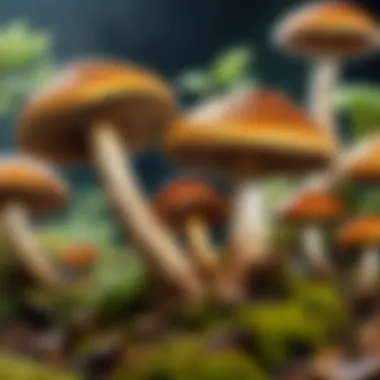
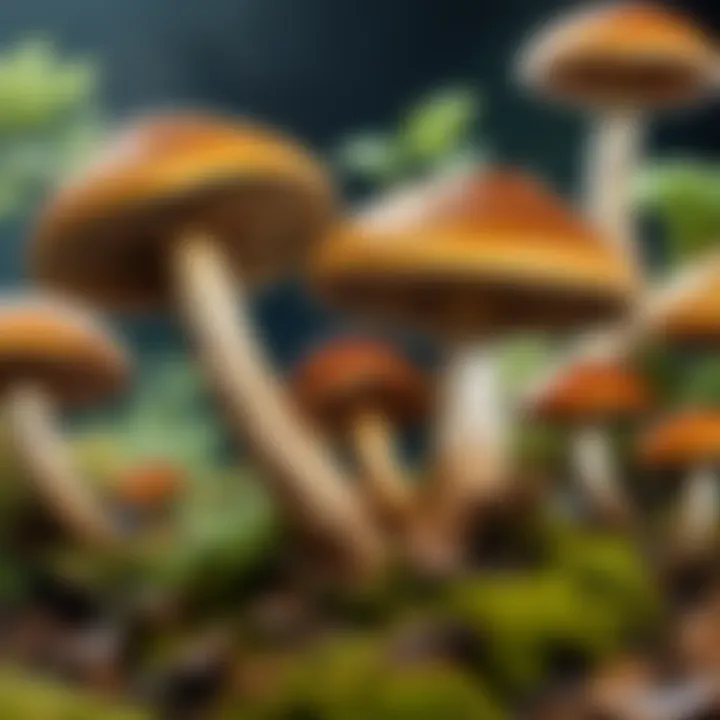
This collaboration is more than beneficial; it is essential for many plants. About 90% of terrestrial plants engage in some form of mycorrhizal association. This symbiosis boosts plant resilience against stressors like drought or pathogen attacks. Plants connected to their fungal counterparts often display healthier growth and improved yields. Essentially, the stronger the mycorrhizal connections, the healthier the ecosystem becomes.
Mushrooms as Decomposers
Decomposing mushrooms occupy a distinct niche in nature's grand scheme. Unlike other organisms, these fungi thrive on decay. They break down tough materials like wood and leaf litter that many creatures find inedible. This process is not just about recycling; it’s about transformation.
Mushrooms target complex substances and enzymatically break them down into simpler compounds. For example, some species can even decompose xylan, a component of plant cell walls. This is a remarkable feat, showcasing the ingenuity of fungi. Furthermore, as mushrooms decompose organic matter, they encourage biodiversity. This is crucial: the presence of diverse organisms in an ecosystem ensures stability and adaptability.
Nutritional Benefits of Mushrooms
Mushrooms aren't just a delightful addition to your meals; they pack a punch when it comes to nutrition. Their diverse profiles make them valuable both on your plate and in a larger ecological system. Understanding the nutritional benefits of mushrooms is essential for anyone interested in health-conscious eating or sustainable living.
Rich Nutritional Profile
Mushrooms stand out with their unique combination of vitamins, minerals, and bioactive compounds. What makes them particularly interesting is their low-calorie count combined with significant nutritional value. For instance, many types of mushrooms are rich in vitamins such as D and B, along with minerals like selenium, copper, and potassium. This unique blend contributes to the overall functioning of our body, supporting a vibrant immune system and promoting bone health.
Furthermore, mushrooms contain antioxidants, which help protect your cells from damage caused by free radicals, potentially reducing the risk of chronic diseases. A classic example includes the shiitake mushroom, renowned for its immune-boosting properties and a considerable amount of lentinans, compounds that may help in fighting infections.
Impact on Digestive Health
When it comes to the gut, mushrooms are an ally. They contain a fair share of dietary fiber, particularly beta-glucans, which not only enhance digestion but may also aid in regulating blood sugar levels. This stands out in a world where digestive issues are rampant. Not only do they help keep your digestive tract running smoothly, but the prebiotic properties of mushrooms can also nurture your gut microbiome. A balanced microbiome is crucial for overall well-being, affecting everything from mood to immune function. For those struggling with conditions like irritable bowel syndrome (IBS), incorporating mushrooms can provide a gentle way to support your system.
Mushrooms and Weight Management
For those watching their waistlines, mushrooms could be worth their weight in gold. Their low calorie density makes them an excellent substitute for higher-calorie ingredients in various dishes, notably in patties and fillings. By replacing meat or heavy fats with mushrooms, you can enjoy a hearty meal without the added calories.
Mushrooms can also promote a feeling of fullness, thanks to their fiber content. This means you can fill your plate without overstuffing your belly—or your daily calorie count. It's a double whammy: tasty and satisfying without the guilt.
To summarize, the nutritional benefits of mushrooms are vast and varied. They offer essential vitamins and minerals, support digestive health, and assist with weight management—all contributing to a balanced diet. With their numerous advantages, mushrooms can easily become a staple in health-centric diets.
"Mushrooms, with their fascinating nutritional profile, can transform meals while enhancing health."
By including mushrooms in your diet, you're not just adding flavor; you’re balancing your health in more ways than one.
For a deeper dive into the health aspects of mushrooms, consider checking out articles on Encyclopedia Britannica or the Wikipedia page dedicated to Mushroom.
Medicinal Uses of Mushrooms
Mushrooms have captured the attention of researchers and health enthusiasts alike due to their multifaceted medicinal properties. They offer a veritable treasure trove of health benefits—ranging from boosting the immune system to potentially combating serious diseases. Understanding how mushrooms impact health is not just an academic exercise; it holds real promise for improving well-being in an era where chronic illness is on the rise.
Antioxidant Properties of Fungi
One of the standout features of many mushrooms is their rich antioxidant content. Antioxidants are compounds that help combat oxidative stress, a factor known to contribute to various chronic conditions. For example, varieties like reishi and shiitake are loaded with polyphenols and other antioxidants. Daily consumption of these kinds of mushrooms may lead to a significant reduction in inflammation levels and improved overall health. Research has shown that the antioxidants found in mushrooms help to neutralize free radicals in the body, potentially lowering the risk of diseases linked to oxidative stress.
- Key antioxidants in mushrooms include:
- Ergothioneine
- Selenium
- Vitamin D
The combination of these antioxidants creates a synergistic effect, enhancing their individual abilities and providing a robust defense against cellular damage.
Potential Cancer-Fighting Compounds
Mushrooms are also being lauded for their potential role in cancer prevention and treatment. Certain compounds harvested from specific fungi, such as polysaccharides and triterpenes, have garnered attention in scientific circles for their ability to inhibit tumor growth and support immune function. The turkey tail mushroom, particularly, has been studied for its effect in immunotherapy for cancer patients. Its polysaccharide-K (PSK) component has been linked with increased survival rates in patients with various types of cancers.
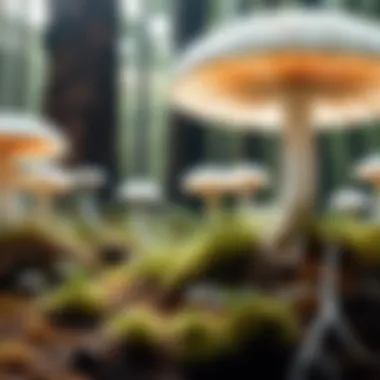
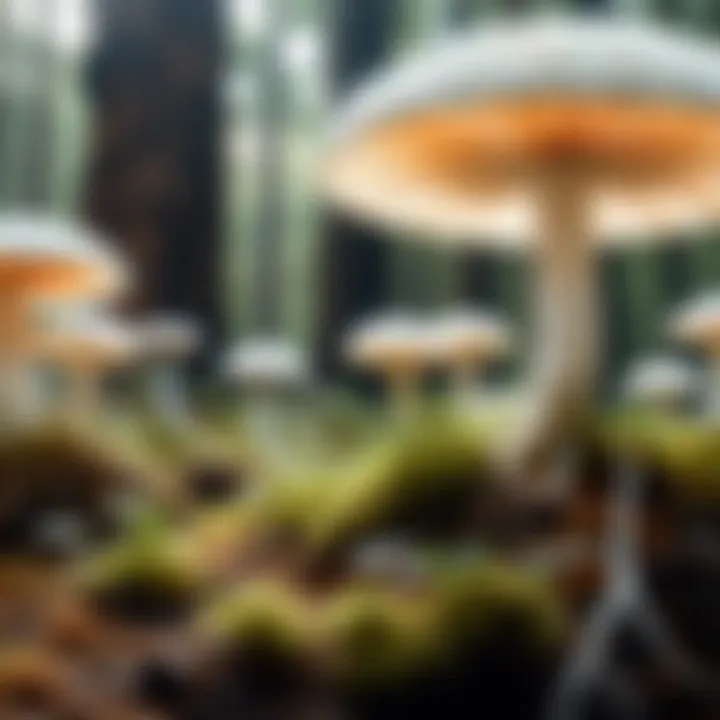
"Mushrooms like reishi and turkey tail are being regarded as the 'golden tickets' in cancer support therapies, providing additional hope to patients in their fight against disease."
Incorporating these fungi into a balanced diet might offer a complementary strategy alongside traditional medical interventions, but it’s worth noting that more extensive clinical trials are needed to better understand their mechanisms in cancer treatment.
Mushrooms in Traditional Medicine
For centuries, various cultures have utilized mushrooms in traditional medicine. In places like China and Japan, certain species have been central to herbal practices aimed at promoting health and longevity.
Examples of such traditional uses include:
- Reishi (Ganoderma lucidum): Frequently called the "mushroom of immortality," reishi is believed to enhance vitality and promote longevity.
- Cordyceps: Used in traditional Tibetan medicine to boost energy and improve athletic performance.
- Lion’s Mane (Hericium erinaceus): Known for its neuroprotective properties, it has been employed to support cognitive function and combat memory issues.
Although these traditional uses are backed by centuries of anecdotal evidence, modern research is beginning to validate some of these claims. Numerical studies now show potential neuroregenerative effects of Lion's Mane, making it a fascinating subject in the field of neurobiology.
In summary, the medicinal uses of mushrooms encompass a wide range of health benefits, solidifying their position as a significant focus within modern medicine and research. Continued studies may unlock new pathways for better health outcomes, merging ancient wisdom with contemporary science.
Innovative Applications of Mushrooms
The application of mushrooms extends far beyond their culinary appeal. We are witnessing an innovative leap in how fungi can address some serious global challenges. Mushrooms have gained traction not just for their health benefits and sustainability contributions, but also for their transformative potential across various industries. By exploring the innovative applications of mushrooms, we can appreciate their versatility and how they can reshape traditional practices into sustainable solutions.
Mycelium-Based Materials for Sustainable Design
Mycelium, the root-like structure of mushrooms, is proving to be a game changer in sustainable materials. The natural ability of mycelium to grow and bind together organic matter presents an environmentally friendly alternative to plastic and other synthetic materials. This is not just theoretical; companies like Ecovative Design are leading the charge by creating packaging and insulation materials made from mycelium that are both biodegradable and renewable.
The production process involves using agricultural waste, such as corn stalks or husks, as the substrate for the mycelium to colonize. Once the mycelium has achieved sufficient growth, it is heat-treated to stop further development and ready for usage. This not only reduces waste but also diminishes reliance on petrochemicals. As designers and architects look for sustainable options, mycelium-based products exemplify the intersection of nature and industry, offering robust and eco-friendly solutions.
"Using mycelium could reduce our dependency on materials that harm the planet and foster a circular economy where waste is minimized."
Mushrooms in Packaging Solutions
As the world grapples with the plastic pollution crisis, mushroom-based packaging is emerging as a viable alternative. Mushrooms can be cultivated into shapes and forms that have utility in packaging, making them an excellent candidate for a cleaner future. This packaging offers the same protective features as cardboard and can decompose in a matter of weeks, contrasting sharply with the hundreds of years required for plastic.
One of the most prominent examples is the fungi packaging developed by companies like MycoWorks and Vijlou. Their products are not only lightweight but also incredibly sturdy. They use a method called "mushroom mycelium binding," where the mycelium grows around agricultural by-products to form a composite material that’s fully compostable. This means after its life cycle, the packaging can return to the soil, minimizing landfill contributions.
Culinary Innovations with Mushrooms
Mushrooms have long been celebrated for their unique flavors and textures in dishes around the globe, but their potential in the culinary world is still unfolding. Chefs and food enthusiasts are experimenting with mushrooms in ways previously thought impossible. From gourmet dishes utilizing truffles and shiitake to innovative uses of mushroom powders for flavor enhancement, the mushroom industry is branching out.
One fascinating trend is mushroom-based meat substitutes. Products like the Beyond Meat burger and other plant-based items are increasingly including mushrooms as primary ingredients. Not only do they provide a meaty texture, but they also enhance the nutritional profile. This shift welcomes people who are either vegetarian or just looking to cut back on meat consumption without sacrificing taste and satiety.
Moreover, mushroom fermentation is gaining popularity, creating umami-rich condiments and sauces that are naturally fermented, lending a unique flair to everyday dishes. The inclusion of functional mushrooms like reishi and lion’s mane in everyday food products is also rising. These varieties are lauded for their health benefits, inviting consumers to consider mushrooms as a staple rather than a supplement.
Challenges Facing Mushroom Cultivation
Mushrooms, known for their diverse applications and benefits, also present a variety of challenges in cultivation. Understanding these challenges is crucial, as they can significantly affect yields and the sustainability of mushroom farming. As we explore these hurdles, it becomes clear that facing these challenges not only requires awareness but creative solutions to ensure a thriving industry. The cultivation of mushrooms is both an art and a science, and recognizing the elements that impede their growth can pave the way for enhanced practices.
Environmental Factors Impacting Growth
The environment plays a substantial role in the success of mushroom cultivation. Factors such as temperature, humidity, and light can spell the difference between a bountiful harvest and an unsuccessful crop. Mushrooms thrive in specific conditions, often requiring a finely tuned balance. For instance, many varieties flourish in cooler temperatures ranging from 55°F to 65°F, while a spike in heat can hinder development.
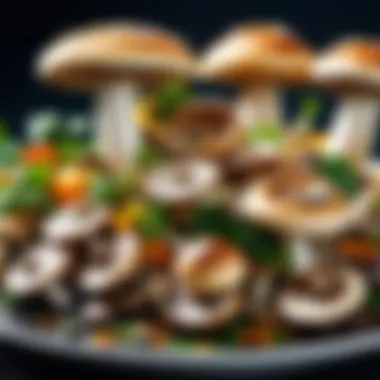
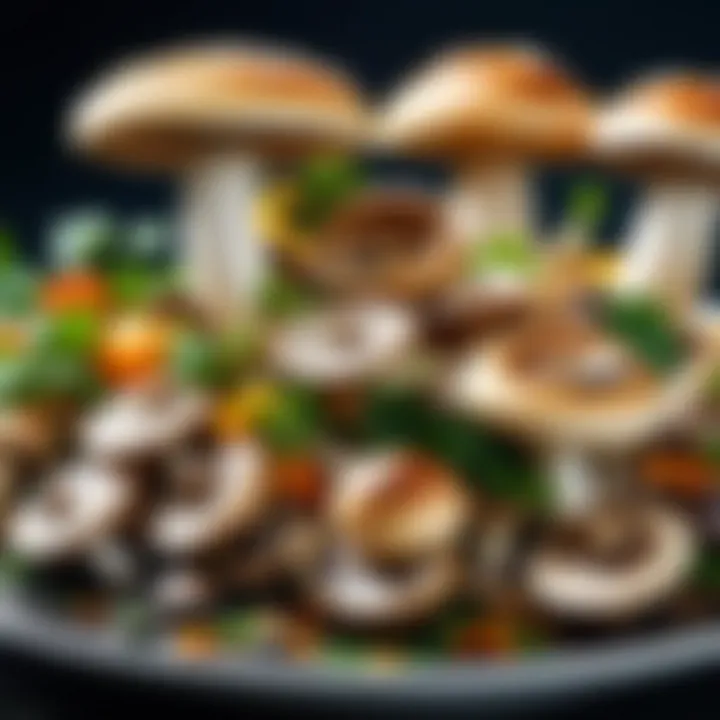
"Understanding and controlling the microclimate is essential for any mushroom grower."
Humidity is equally important; most types demand between 80-90% humidity during the fruiting phase. If these levels drop, mushrooms can dry out, resulting in poor quality and lower yields. Special tools such as humidifiers and temperature control systems are often necessary to maintain these conditions, contributing to the cost of production.
Light too, though often believed to hinder mushroom growth, plays a role in determining the shape and quality of the fungi produced. The slightest variation can lead to deformities, affecting marketability. Not just any light will do; most mushrooms prefer indirect light to thrive.
Pests and Diseases Affecting Fungi
Just like any other crop, mushrooms are not immune to pests and diseases. The presence of unwanted guests often leads to significant losses. Common pests such as fungal gnats and maggots can easily ruin a harvest. These pests tend to feast on the mycelium and the developing fruiting bodies, inhibiting growth or even killing the crop.
Meanwhile, diseases such as Trichoderma can invade mushroom farms, targeting mushrooms during their growth phase. The impact of these diseases goes beyond the immediate loss of produce; they leave the grower facing potential financial doom. Managing pests often involves the use of pesticides, which, if not managed properly, can lead to contamination and a further spiral of issues in cultivation.
- Regular inspections of the growing medium can help identify problems early.
- Implementing integrated pest management practices may also reduce reliance on chemical solutions, fostering a healthier crop.
In summary, the challenges of mushroom cultivation are multifaceted, extending from environmental factors to persistent pests and diseases. Identifying these challenges is the first crucial step towards finding innovative solutions that allow for sustainable and profitable mushroom farming.
Future of Mushroom Research
The exploration of mushrooms transcends mere culinary interest; it's a crucial part of environmental science, health, and sustainable practices. As we step into a future where the challenges of climate change and health issues persist, ongoing research into mushrooms provides hope. This section emphasizes the need for progressive studies in mycology, exploring innovative methodologies and potential applications that can significantly alter our approach to food security, environmental restoration, and even healthcare.
Emerging Innovations in Mycology
Mushrooms are more than just a tasty addition to meals. They represent a field ripe with potential for scientific breakthroughs. Innovations in mycology cover a wide array of topics ranging from genetic engineering to bioinformatics. For instance, scientists are currently experimenting with hybrid strains of edible fungi. These hybrids not only grow faster but also exhibit enhanced nutritional profiles. Growing mushrooms hydroponically is another technique gaining momentum, promoting efficient resource use, which minimizes the eviromental impact.
In addition, researchers are diving into the mycelium network—the underground fungal structure that acts like a natural internet for plants. Understanding and manipulating these networks could revolutionize agriculture. Fungi can enhance soil quality and protect plants from diseases while also providing natural fertilizers. It's a win-win for farmers looking to embrace more eco-friendly practices.
"By exploring the genetics of mushrooms, we may uncover solutions that have significant implications for food production and environmental conservation."
Integration of Mushrooms in Sustainable Practices
Today, integrating mushrooms into sustainable practices is not limited to agriculture; it spans diverse fields. This application includes using mycelium to create biodegradable packaging alternatives. With companies like Ecovative leading the way, mycelium is being used to produce materials that can degrade naturally in the environment, potentially replacing plastics.
Furthermore, mushrooms have made their way into modern construction techniques. Mycelium composites are strong yet lightweight, offering a robust alternative to traditional building materials. This shift addresses the growing concern regarding resource depletion, bringing forth a more circular economy.
In the realms of healthcare, the sustainable use of fungi for medicinal purposes holds promise. Research is pointing toward the utilization of certain mushroom extracts for developing pharmaceuticals, particularly in the realm of antibiotics and immunotherapy. The global burden of antimicrobial resistance emphasizes this need.
Some key considerations regarding the integration of mushrooms in sustainable practices include:
- Resource Efficiency: Mushrooms can be grown on agricultural waste, converting it into valuable food or materials.
- Carbon Sequestration: Mycelium can help in carbon capture, contributing to climate change mitigation efforts.
- Biodiversity: Promoting mushroom varieties can enhance biodiversity in agriculture.
The future of mushrooms seems to be continually expanding into uncharted territory, revealing innovative ideas that might just change the world as we know it. Embracing the potential of fungi promises not just a sustainable future, but one rich in possibilities.
Ending
The concluding section of this article underscores the pivotal role that mushrooms play not just in ecological systems, but also in human life. It wraps together various threads discussed throughout, painting a clear portrait of their significance. As we've explored, mushrooms are not merely a culinary delight; they are foundational to ecosystem health, offering a wealth of nutritional and medicinal benefits. From their function as decomposers, enhancing soil quality, to their innovative applications in sustainable design, mushrooms demonstrate versatility that is hard to ignore.
Summary of Key Findings
A few key takeaway points from the article are worth reiterating:
- Ecological Role: Mushrooms contribute significantly to nutrient cycling, serving as vital decomposers in the ecosystem.
- Health Benefits: They boast a rich nutritional profile, rich in vitamins, minerals, and antioxidants that can bolster health and aid in weight management.
- Medicinal Uses: Certain species of mushrooms hold compounds that show promise in cancer research and other medical applications.
- Innovative Applications: The mycelium of mushrooms is being used to create sustainable materials for packaging and other industries, hinting at a greener future.
- Research and Future Potential: Ongoing research is paving the way for surprising discoveries in various fields including agriculture and medicine, showcasing mushrooms as a promising area for innovation.
"Mushrooms are a treasure trove of functionality, not just a plate of food. Their integration into multiple industries signals a notable shift in how we perceive our fungi friends."
The Path Forward for Fungi
As we look to the horizon, the future of mushrooms appears bright. Scientists and researchers are opening new doors every day. The increasing focus on sustainable practices makes mushrooms incredibly relevant. With biotech advancements, mushrooms could play a monumental role in addressing climate change issues through bioremediation and other ecological contributions.
The re-engagement with traditional knowledge, combined with modern science, makes for a compelling narrative. As we incorporate mushrooms into our diets, build our sustainable products, and continue to study their medical potential, we aren't just embracing a trend; we are redefining our relationship with nature. This fresh perspective on fungi positions them as indispensable allies in navigating the complexities of our environmental challenges.
Given their unique properties and versatility, moving forward, it's essential for both entrepreneurs and researchers to explore this vast mycological frontier, ensuring that our fungal companions contribute to a healthier planet.







